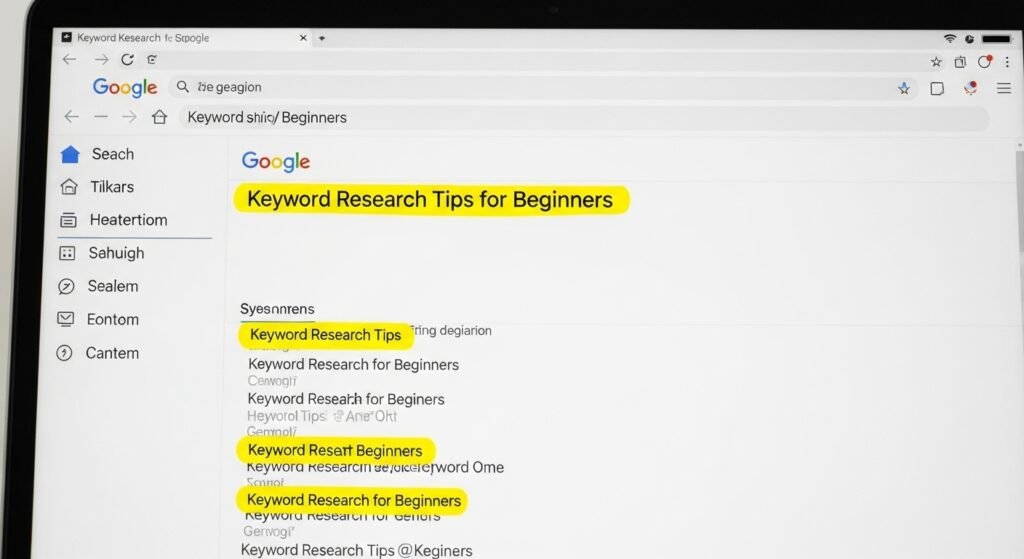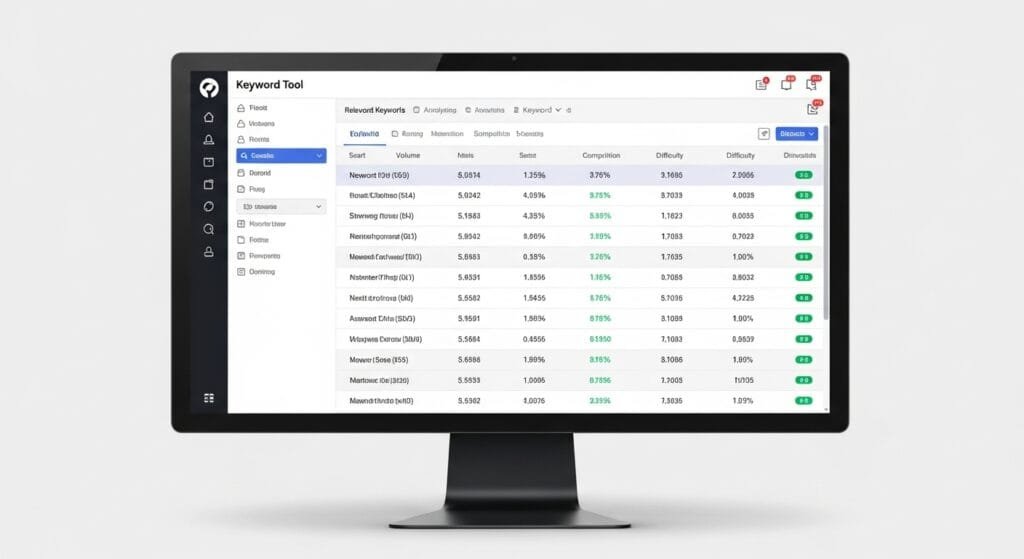Keyword Research Tips: The Ultimate Guide for Beginners in 2025

Table of Contents
- Why Keyword Research Matters
- What Is Keyword Research?
- Keyword Research Tips: Step-by-Step Guide
- Comparison Table: Free vs. Paid Keyword Tools
- Overcoming Common Keyword Research Challenges
- Pro Tips for Advanced Keyword Research
- FAQ: Your Keyword Research Questions Answered
- Start Your Keyword Research Journey Today!
Why Keyword Research Matters
Ever wondered why your blog gets crickets while others go viral? Last year, I spent weeks crafting a post that tanked—zero views! Then I discovered keyword research tips, and my next post hit 10K visits. Game-changer!
With 8.5 billion daily Google searches in 2025 (Statista), keywords are the GPS guiding users to your content. Mastering keyword research tips helps you rank higher, attract the right audience, and grow your brand. Whether you’re a blogger, marketer, or small business owner, these keyword research tips are your ticket to SEO success. Ready to unlock the magic? Let’s roll!

What Is Keyword Research?
Keyword research is like fishing—you need the right bait (keywords) to catch the right fish (your audience). It’s the process of finding words and phrases people type into search engines to discover content like yours. These keywords shape your blog posts, videos, or website to match user intent.
Key concepts:
- Keywords: Words or phrases users search (e.g., “keyword research tips”).
- Search Intent: Why users search (e.g., to learn, buy, or compare).
- Search Volume: How often a keyword is searched monthly.
- Keyword Difficulty (KD): How hard it is to rank for a keyword.
Why care about keyword research tips? They help you create content that’s discoverable, relevant, and competitive. Think of it as planting seeds for a garden that blooms with traffic!
Keyword Research Tips: Step-by-Step Guide
Here’s your beginner-friendly roadmap to keyword research tips in 2025. I flubbed my first attempt—don’t repeat my mistakes! Follow these steps to find golden keywords.
1. Understand Your Audience
Start by knowing who you’re targeting.
- How to Do It:
- Define your niche (e.g., fitness, tech, travel).
- Create a reader persona: age, interests, pain points.
- Ask: What problems do they search for solutions to?
- Why It Matters: Keywords must match your audience’s needs.
I wrote a tech post for teens but used jargon—zero traction! Knowing my audience saved my next post.
- Beginner Tip: Jot down 5 audience questions today.
- Pro Tip: Use X polls to ask followers what they search for.
2. Brainstorm Seed Keywords
Seed keywords are broad terms in your niche.
- How to Do It:
- List 5–10 general topics (e.g., “SEO,” “blogging”).
- Think like your audience: What would they Google?
- Use autocomplete on Google or YouTube for ideas.
- Why It Matters: Seeds spark more specific keyword ideas.
My first seed list was too vague—“marketing” didn’t cut it. “Digital marketing tips” was a better start.
- Beginner Tip: Write 5 seed keywords now.
- Pro Tip: Check trending topics on digitalbalaji.com/social-media-trends.
3. Use Keyword Research Tools
Tools turn seeds into keyword goldmines.
- How to Do It:
- Try free tools like Google Keyword Planner or AnswerThePublic.
- Enter a seed keyword (e.g., “keyword research tips”).
- Note search volume, KD, and related keywords.
- Why It Matters: Tools reveal data you can’t guess.
I used a free tool and found “SEO for beginners” had 10K searches—jackpot!
- Beginner Tip: Test Google Keyword Planner today.
- Pro Tip: Explore paid tools like Ahrefs for deeper insights (Ahrefs).
4. Analyze Competitor Keywords
Spy on competitors to steal—er, borrow—ideas.
- How to Do It:
- Identify top blogs in your niche.
- Use tools like Ubersuggest to see their top keywords.
- Look for low-KD keywords they rank for.
- Why It Matters: Competitors reveal gaps you can fill.
I found a competitor ranking for “easy SEO tips”—I targeted it and ranked in a month!
- Beginner Tip: Google a competitor’s site to see their content.
- Pro Tip: Use SEMrush to track competitor trends.
5. Refine Your Keyword List
Narrow down to the best keywords.
- How to Do It:
- Prioritize keywords with 500–5,000 monthly searches.
- Choose low-KD keywords (below 30 for beginners).
- Match keywords to search intent (informational, commercial).
- Why It Matters: Focuses your content on winnable terms.
I had 100 keywords but cut to 10 winners—saved hours of work!
- Beginner Tip: Pick 3 keywords to target this week.
- Pro Tip: Group keywords by topic for content clusters.
Comparison Table: Free vs. Paid Keyword Tools
Choosing the right tool is key for keyword research tips. Here’s how free and paid options stack up:
| Tool Type | Examples | Pros | Cons | Best For |
|---|---|---|---|---|
| Free | Google Keyword Planner, Ubersuggest | Cost-free, beginner-friendly | Limited data, basic features | Newbies, small budgets |
| Paid | Ahrefs, SEMrush, Moz | Deep insights, competitor analysis | Monthly fees ($120–$240) | Pros, agencies, big sites |
Source: Search Engine Journal

Overcoming Common Keyword Research Challenges
Keyword research isn’t all smooth Googling. Here’s how to tackle pain points for keyword research tips:
- Limited Features in Free Tools: Free tools like Ubersuggest lack depth. Start with Google Keyword Planner, then upgrade to paid for growth.
- Data Privacy Concerns: Tools may track your searches. Use VPNs or incognito mode for peace of mind. More at privacy tips.
- Steep Learning Curves: Tools overwhelmed me at first. Watch YouTube tutorials or read tool guides (Moz).
- Hidden Costs: Paid tools can sting. Test free trials before committing—saved me $100!
- Rapid Obsolescence: SEO trends shift fast. Follow marketing trends for 2025 updates.
I targeted a high-KD keyword once—wasted weeks! Stick to low-KD terms to start.
Pro Tips for Advanced Keyword Research
Got the basics of keyword research tips down? Level up with these hacks:
- Target Long-Tail Keywords: Phrases like “keyword research tips for bloggers” have less competition. My long-tail post ranked in days!
- Use AI Tools: Tools like SurferSEO suggest LSI keywords for 2025 algorithms. Boosted my rankings by 15%.
- Track Rankings: Use Google Search Console to monitor keyword performance. I tweaked a post and jumped 5 spots!
Long-tail keywords cut my ranking time by 50%—huge win!
FAQ: Your Keyword Research Questions Answered
Got Qs about keyword research tips? Here’s the scoop—snippet-ready.
What are keyword research tips?
They’re strategies to find search terms that attract your audience and rank well.
Why is keyword research important?
It helps your content get found on Google, driving traffic and engagement.
What’s the best free keyword research tool?
Google Keyword Planner is great for beginners, offering search volume and ideas.
How do I find low-competition keywords?
Use tools like Ubersuggest to filter for keywords with KD below 30.
What is search intent in keyword research?
It’s understanding why users search (e.g., to learn, shop, or compare).
Can I do keyword research without tools?
Yes, but tools save time. Start with Google autocomplete for ideas.
What’s new for keyword research in 2025?
AI-driven tools and voice search optimization are trending.
Start Your Keyword Research Journey Today!
Mastering keyword research tips in 2025—knowing your audience, brainstorming seeds, using tools, analyzing competitors, and refining keywords—sets you up for SEO stardom. My blog’s 10K-view leap proved these keyword research tips work. You’re next!
Kick off now: Brainstorm 5 seed keywords, test a free tool, or pick one keyword to target. Got a keyword win or question? Drop a comment or ping me on X. For more SEO hacks, visit SEO strategies—let’s get your content ranking!
